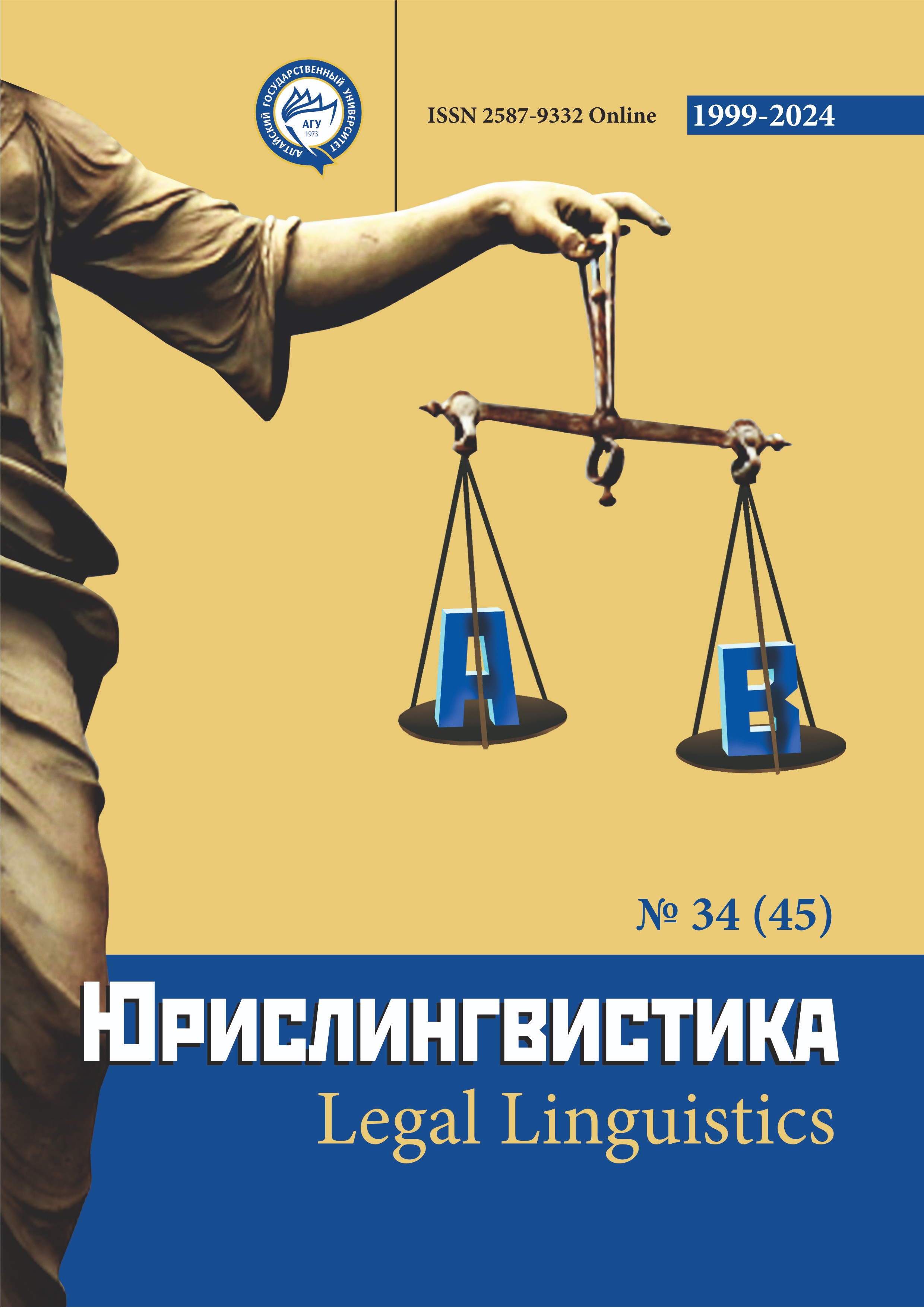Concerning Criminalistic Diagnostic Complexes in Forensic Linguistic Expertise
УДК 81`33, ББК 81
Abstract
The authors consider the existing concepts of diagnostic complexes in linguistic expertise and come to the conclusion that such diagnostic complexes are of a criterion-evaluative nature, and examinations conducted according to them are reduced to making legal evaluations, rather than establishing facts, which is the purpose of forensic examination (both in procedural and research aspects). The article raises the problem of the reasonableness and correctness of the use of criminalistic theories in linguistic expertise. It was established that there is a contradiction between diagnostic complexes in linguistic expertise and the theory of criminalistic diagnostics. The latter is founded on the scientific principle of obtaining knowledge about some facts using knowledge about other facts. In the authors' opinion, expert diagnostics in linguistic expertise should be based rather on knowledge about the facts and phenomena of reality described in linguistic theories, rather than on evaluation criteria. The authors present argument to the thesis that methods founded on linguistic theories should be developed, rather than those founded on interpreting linguistic facts in the light of legal norms.
Downloads
Metrics
References
Белкин Р. С. Курс криминалистики: В 3 т. М., 2001. Т.2.
Бринев К. И. Судебная лингвистическая экспертиза: методология и методика: монография. М., 2017.
Бринев К. И., Куликова М. Г. О некоторых проблемах, связанных с производством комплексной психолого-лингвистической экспертизы продуктов речевой деятельности / Юрислингвистика. – 2023. – №30(41). – С. 65-70.
Бринев К. И., Тюкаева Н. И. О прагматических свойствах высказываний с оскорбительной номинацией лица (лингвистическая экспертиза и инвективное функционирование языка) / Филология и человек. – 2023. – № 4. – С. 31-48.
Изотова Т. М., Кузнецов В. О., Плотникова О. М. Судебная лингвистическая экспертиза по делам об оскорблении. М., 2016.
Корухов Ю. Г. Криминалистическая диагностика при расследовании преступлений. М., 1998.
Корухов Ю. Г., Майлис Н. П., Орлова В. Ф. Криминалистическая экспертная диагностика (Методическое пособие). М., 2003.
Кузнецов В. О. Современные тенденции формирования и развития экспертных понятий как элемента языка судебной экспертологии: диссертация ... кандидата юридических наук: 12.00.12. М., 2020.
Кукушкина О. В., Сафонова Ю. А., Секераж Т. Н. Методика проведения комплексной судебной психолого-лингвистической экспертизы по делам, связанным с противодействием экстремизму и терроризму. М., 2022.
Кукушкина О. В., Сафонова Ю. А., Секераж Т. Н. Теоретические и методические основы судебной психолого-лингвистической экспертизы текстов по делам, связанным с противодействием экстремизму. М., 2011.
Почерковедение и почерковедческая экспертиза / под ред. В. В. Серегина. Волгоград, 2014.
Россинская Е. Р. Судебная экспертиза в гражданском, арбитражном, административном и уголовном процессе. М., 2011.
Семантические исследования в судебной лингвистической экспертизе: методическое пособие / А. М. Плотникова, В. О. Кузнецов, И. И. Саженин и [др.]; под ред. профессора С. А. Смирновой. М., 2018.
Типовые экспертные методики исследования вещественных доказательств. Ч.1 / Под ред. канд. техн. наук Ю. М. Дильдина. Общая редакция канд. техн. наук В. В. Мартынова. М., 2010.
Copyright (c) 2024 Константин Бринев, Мария Куликова

This work is licensed under a Creative Commons Attribution 4.0 International License.
The authors, which are published in this journal, agree to the following conditions:
1. Authors retain the copyright to the work and transfer to the journal the right of the first publication along with the work, at the same time licensing it under the terms of the Creative Commons Attribution License, which allows others to distribute this work with the obligatory indication of the authorship of this work and a link to the original publication in this journal .
2. The authors retain the right to enter into separate, additional contractual agreements for the non-exclusive distribution of the version of the work published by this journal (for example, to place it in the university depository or to publish it in a book), with reference to the original publication in this journal.
3. Authors are allowed to post their work on the Internet (for example, in a university repository or on their personal website) before and during the review process of this journal, as this may lead to a productive discussion, as well as more links to this published work (See The Effect of Open Access).










